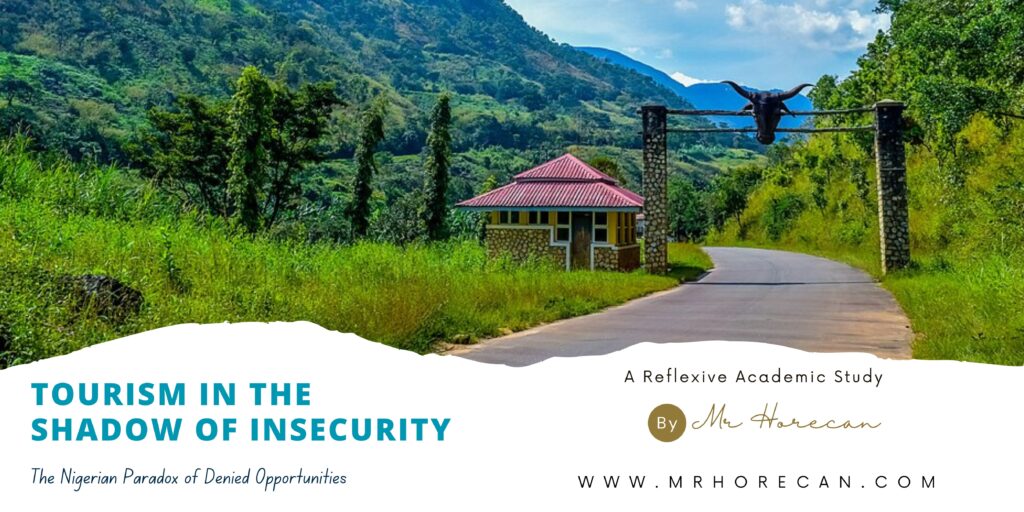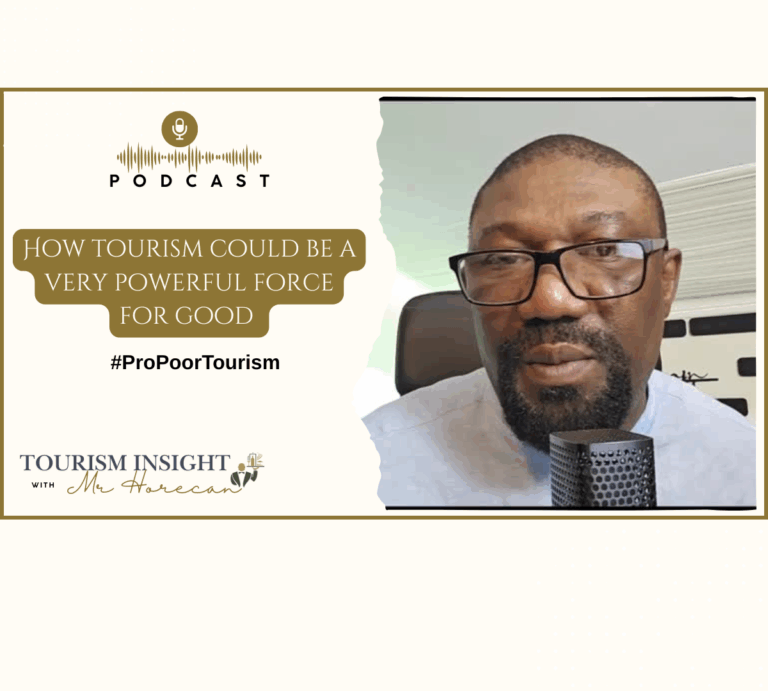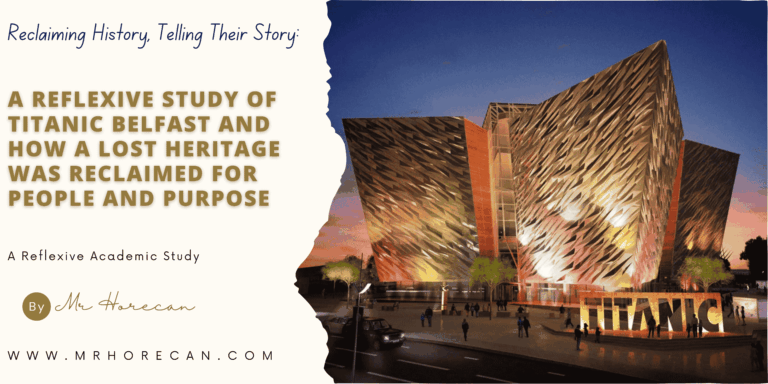
Tourism, at its core, is an act of voluntary movement — a deliberate choice made by individuals to explore new destinations, cultures, landscapes, and identities. It is rooted in freedom, curiosity, and economic ability. But in Nigeria, a country of over 223 million people, tourism has become entangled in a crisis of identity, statistics, and security. The numbers may suggest growth, but the lived realities paint a more sobering picture.
In 2024, Nigeria recorded around 1.2 million international arrivals. While that may appear promising, a closer look reveals that over 90% of these visitors were Nigerians in the diaspora—returning home to visit family or attend events. According to international standards set by the United Nations Tourism Organization (UN Tourism, 2024), such travel falls under “Visiting Friends and Relatives” (VFR) and is considered necessity-driven movement, not leisure tourism. True tourism, by contrast, involves travel by choice, not obligation — motivated by recreation, relaxation, and cultural discovery.
Yet, in official documents and economic forecasts, Nigeria lumps all these categories together. As a result, the country projects a tourism GDP contribution of ₦11.2 trillion (US$7.5 billion) by 2025, which the World Travel & Tourism Council (WTTC) suggests could account for 4.9% of GDP if current trajectories hold. But this projection is not grounded in purely leisure-driven data. In reality, Nigeria’s direct tourism contribution to GDP in 2019 was US$2.6 billion (about 4%), and the total sector impact — including indirect and induced effects — was US$7.9 billion (Tourism Economics, 2019). Recent years have shown little movement from that baseline.
This conflation of movement with meaningful tourism creates an inflated sense of progress and masks the sector’s structural weaknesses. Unlike in other African or post-conflict nations, Nigeria’s tourism economy remains precariously dependent on the diaspora and event-based travel, not on sustainable, repeat leisure visitation.
A global comparison illustrates this gap more clearly. The Gambia, with a population of just 2.7 million, received over 230,000 international leisure tourists in 2024. Tourism contributes nearly 17% to the country’s GDP, driven by strategic investments in community-based tourism like the Ninki Nanka Trail, which offers immersive cultural experiences and equitable benefits for locals. Kenya, with a population of 54 million, is on track to welcome 3 million international tourists in 2025, thanks to a diversified portfolio that includes eco-tourism, MICE events, and medical tourism — all underpinned by national policy alignment and branding coherence. In Tanzania, responsible tourism practices have built long-term visitor loyalty through models that respect culture and conserve nature.
The most striking comparison, however, comes from Northern Ireland. Before the 1998 Good Friday Agreement, the region’s tourism activity was minimal, overshadowed by political violence and instability. Post-conflict, Northern Ireland repositioned itself through strategic peace branding, cultural storytelling, and targeted destination development. Titanic Belfast, the Game of Thrones filming trail, and a revitalized Belfast city center have helped tourism contribute over 5% to regional GDP by 2023 — all within a population of just 1.9 million. Here, peace was not simply a dividend; it became the catalyst and the product.
Nigeria’s failure to build such a resilient, intentional tourism model is not due to a lack of potential. The country boasts a rich tapestry of destinations, from the Obudu Mountain Resort to the Ogbunike Caves, from the beaches of Lagos to the sacred Osun-Osogbo Grove. What it lacks is a coordinated, safe, and accessible ecosystem.
Security remains the elephant in the room — and not merely as a background condition, but as a central component of the tourism product. Safety determines perception. It defines freedom of movement. It shapes global rankings and guides investor decisions. In Nigeria, insecurity affects not just travelers’ willingness to visit but also the ease of access through transport systems that are underfunded, disconnected, and expensive. Domestic air travel is overpriced and unreliable. Road infrastructure is decaying. Rail is underdeveloped. Sea transport is nearly non-existent. All of this raises the cost of tourism participation for both hosts and guests.
On the policy front, Nigeria suffers from fragmentation and inertia. There is no unified national tourism strategy that integrates infrastructure, security, community participation, and digital innovation. Unlike Northern Ireland’s post-conflict branding or Kenya’s tourism master plans, Nigeria lacks a central narrative, institutional coordination, and measurable benchmarks. This vacuum not only diminishes local stakeholder engagement but also deters global interest.
If we filtered out necessity-driven movement from Nigeria’s tourism statistics — excluding business travel, funeral visits, diaspora returns, and short domestic commutes — what would remain? A startlingly thin layer of real tourism activity. Without diaspora-fueled spikes like “Detty December,” Nigeria’s leisure numbers would likely collapse. This is a dangerous place to be: a tourism economy running on obligation, not desire.
So, what would it take to shift this reality? It begins with acknowledging that tourism cannot be built on flawed assumptions. Nigeria must realign its data collection methods with global best practices. This means introducing purpose-of-travel classifications, correcting for diaspora bias, and reporting both gross and adjusted tourism figures — as done by the UK Office for National Statistics (ONS) and Eurostat.
Beyond methodology, Nigeria must develop a national tourism strategy that treats peace, infrastructure, and inclusive policy as investments — not afterthoughts. Security must be mainstreamed into the product itself. Infrastructure — from roads to airports to digital services — must be tourism-ready, not just economically viable. And policy must prioritize community inclusion, pro-poor tourism, and destination marketing.
This is not just an economic imperative; it is a moral one. Tourism, when designed with intention, can feed children, fund schools, preserve heritage, and create jobs. Nigeria deserves a tourism industry that reflects its richness — not just its resilience. The time to reimagine that future is now.
To all stakeholders, academics, policymakers, and entrepreneurs: the question is no longer “Can tourism thrive in an insecure country?” The real question is: “Can Nigeria afford to let it fail?”
 Read more studies, advocacy tools, and reflections on Pro-Poor Tourism at:
Read more studies, advocacy tools, and reflections on Pro-Poor Tourism at: www.mrhorecan.com/insights/
www.mrhorecan.com/insights/ Listen to the upcoming debate on this article on Tourism Insight with Mr Horecan
Listen to the upcoming debate on this article on Tourism Insight with Mr Horecan



